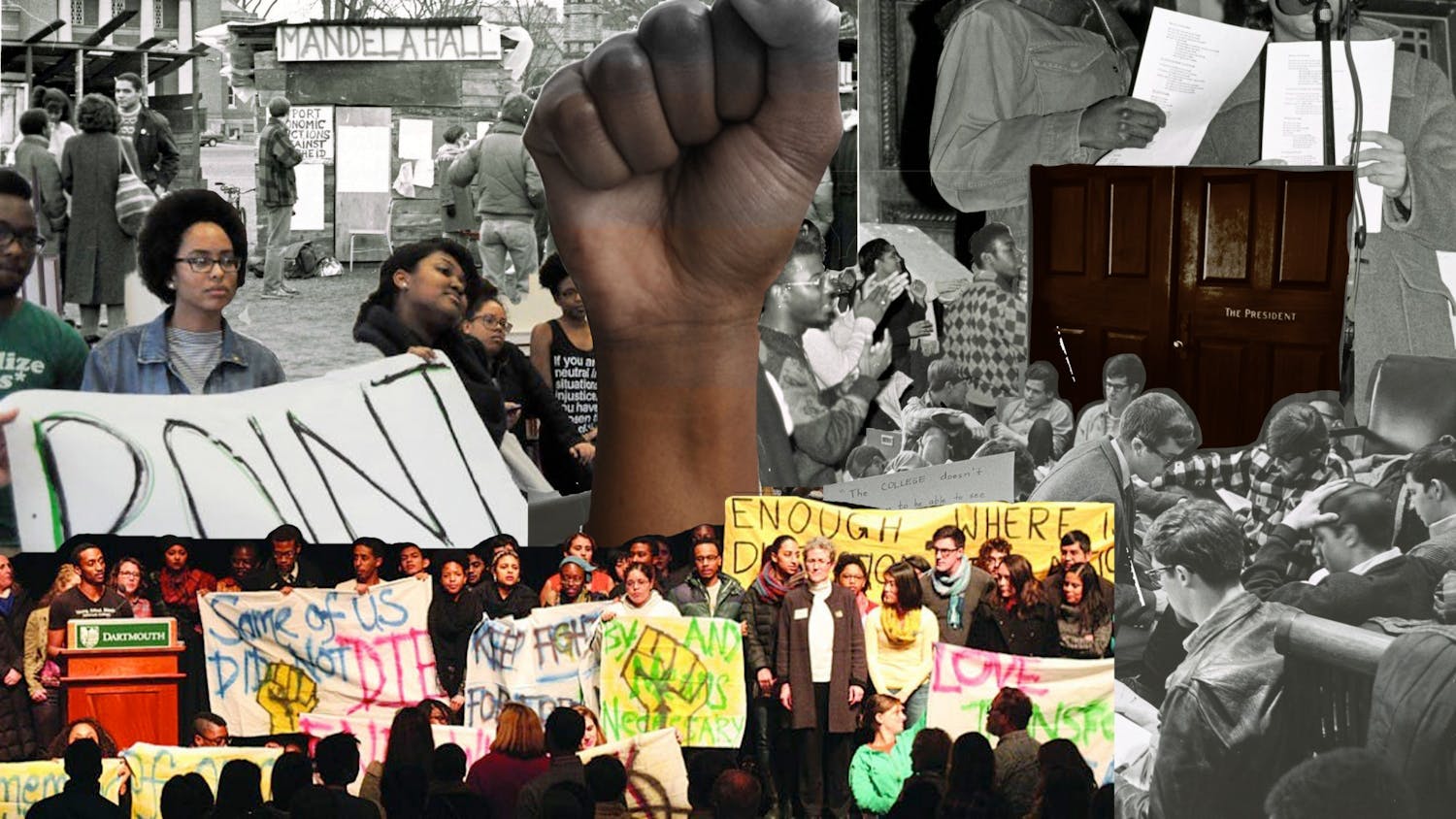This article is featured in the 2021 Winter Carnival special issue.
On April 29, 1984, The Dartmouth Review secretly recorded and published details of a Gay Student Association meeting on campus. In the fallout of the event, campus-wide conversations arose on privacy and how to support LGBTQ+ students.
Decades later, the legacy of the incident persists, raising questions about queer spaces on campus. Under the physical restrictions of the pandemic, LGBTQ+ students have turned toward digital forms of communication to connect, leading to new questions of online privacy.
A secret recording
Jay Berkow ’85, GSA president at the time of the recorded meeting, noted that roughly two-thirds of the organization’s membership were “in the closet.” The GSA’s meetings, according to Berkow, sought to create a forum for these students who had not yet come out or were dealing with other issues surrounding their identity, particularly in the absence of queer spaces on campus.
“[The College] was at its best, hands-off, and at its worst, kind of supporting and encouraging anti-gay sentiment on campus,” Berkow said.
The first of the GSA’s meetings open to the wider Dartmouth student body, which was publicized via ads in The Dartmouth and flyers around campus, was slated for April 29, 1984. At the start of the meeting, Berkow said everyone was made to sign a paper stating that “nothing that gets said in this meeting ever gets repeated outside of this meeting, and it is all in private.”
Unbeknownst to Berkow, Teresa Polenz ’87, one of the students in attendance, had been sent by then-Review editor-in-chief Laura Ingraham ’85 to allegedly investigate how the GSA was spending its funds. According to Berkow and Stephen Carter ’86, another student who attended the meeting, Polenz had entered explaining that she wanted to attend because she was questioning her sexuality.
Carter described Polenz as being “too forceful” with her questions and said her visit “didn’t seem right” because people “usually didn’t come in as a curious person.” However, he noted, the members “had a philosophy that anyone could join.”
Throughout the meeting, Polenz would get up and excuse herself to walk outside to flip her tape, according to Berkow and Carter. At the end of the meeting when a group of members, including Berkow, confronted her at her dorm, she confessed to being a reporter for The Review.
Berkow noted that students at the meeting had “revealed a lot of their own personal lives,” leaving them in a “vulnerable” position. According to Berkow, one of the students in attendance was someone on an ROTC scholarship, who, if outed by The Dartmouth Review, would lose their college scholarship.
Despite confronting Polenz, Berkow mentioned that she refused to give up the tapes, and a transcript of the meeting was eventually published by The Dartmouth Review. The transcript did not include names except for two club officers, one of them being Berkow. However, Berkow mentioned that “the entire transcript was published in the paper, so even if [a] name wasn’t mentioned, it was pretty easy to identify people.”
The aftermath
According to Berkow, the incident changed his life “enormously.” As The Review became embroiled in a legal battle due to the recording, he recalled news reporters “constantly” pulling him out of class to speak with him. At the same time, he noted that he was “luckily” living off campus, away from the “bullying and aggression towards the gay community,” and his reputation allowed him to escape much of the harassment as well.
“I was such an outspoken, strong, angry man at the time that I think people were afraid of me because I wasn’t afraid of them,” Berkow said.
Ultimately, according to an October 1984 New York Times report, the New Hampshire state attorney general opted not to prosecute Polenz, who was under investigation for potentially violating felony wiretapping and misdemeanor privacy laws.
Ingraham claimed that since the GSA had “advertised” the meeting, participants had given up confidentiality and that it was a "freedom of the press issue," according to an Associated Press report from July 1984.
“Part of what we did was journalistically justifiable: The group received college funding but, unlike every other student group receiving a college grant, refused to make public its membership or budget,” Ingraham wrote in a Washington Post column over a decade after the incident. “We wanted to find out how student funds were being spent and to demonstrate the double standard Dartmouth had created by funding the group. But in doing so, we adopted a purposefully outrageous tone — occasionally using, for example, the word ‘sodomites’ to describe campus gays.”
Berkow characterized the community’s reaction in the aftermath of the events as “polarized.” Similarly, Carter noted that here was “outrage from the more progressive groups,” but The Review also “validated the people who were homophobic.”
Moreover, Carter mentioned the LGBTQ+ presence on campus “wasn’t as tight of a community” itself at the time due to privacy concerns, given the large share of closeted members. The tape recordings made ties among the community “more tenuous,” he said, and he believes that people were even more unwilling to come to subsequent meetings because they were “on edge.”
Ultimately, though, Carter believes The Dartmouth Review’s article “backfired” because it “solidified” the need for greater support for the LGBTQ+ community at Dartmouth, especially after the “horrible” treatment he said queer students regularly endured came to light.
According to Carter, the GSA continued “business as usual” in the aftermath of the recording because they recognized “the worst [had] been done,” and they did not expect another similar incident to occur. Meetings and social gatherings continued, and he noted that support from the student body throughout the ’80s and ’90s began to grow at a “very, very slow” rate.
Meanwhile, Berkow said that students who were “outed were made to feel like Dartmouth was not a place to go to school, so they left and went to other schools.” While the College did not support The Dartmouth Review, Berkow noted, they “certainly didn't come out against them either.”
Although he waited until his graduation, Berkow “ran out” of Dartmouth and said he did not intend to return.
Queer life on campus, four decades later
Throughout the years, Dartmouth’s LGBTQ+ community has expanded, and resources like the Office of Pluralism and Leadership have provided spaces for queer students. However, concerns about privacy and security remain.
Within, a group founded last winter, is currently the only student-led organization focused on providing a space for the LGBTQ+ community on campus. Val Werner ’20, Within’s president, described the organization as a social and advocacy group.
A main concern for Within amid the pandemic has been managing the security of meetings, especially given the prevalence of “Zoombombings,” or unwanted and disruptive guests on Zoom calls. As a way to regulate who entered the meetings, Werner explained that the organization would not send out the link to meetings through the “Campus Events” listserv. So far, the organization has avoided falling prey to any breaches in security, Warner said.
Nicolas Macri ’24 said that with the relatively new environment of virtual spaces, communication and interaction in the LGBTQ+ community have persevered through the pandemic. Macri attributed it to the initiative of fellow members within the community, who created virtual spaces like group chats and Zoom meetings.
Macri said that within the queer community, there is a struggle to navigate between protecting people’s privacy and not hiding the “existence of LGBTQ+ people.”
For conversations via group chats, who is admitted and who is not may be a particularly complicated question.
“The thing about being LGBTQ+ is there’s no real way to know — there’s no proof,” Macri said.
Students have to rely on each other and trust that they will not leak any private information that is mentioned in these spaces, Macri noted.
Although it is not explicitly an LGBTQ+ organization, the Amarna undergraduate society, according to its president, Nathaniel Stornelli ’21, has become a “space that is very queer by nature.” Stornelli emphasized that members of Amarna are expected to respect each other’s boundaries and privacy, but there can always be more done to ensure everyone feels secure in their space.
“I guess part of it is having that philosophy that we are a safe space, so the people who come [to Amarna] will want to respect that — and that’s well and good — but we should be doing more to make sure that happens,” Stornelli said. They added that under their presidency, if a breach of trust were to occur, they would call a disciplinary hearing “so fast.”
Reflecting on the 1984 GSA incident, Stornelli noted that such events can and should inform present-day discussions on privacy within Dartmouth’s queer community.
“I think we need to have these conversations and remember some of Dartmouth’s uglier history and use that to move into a better place,” they said.





